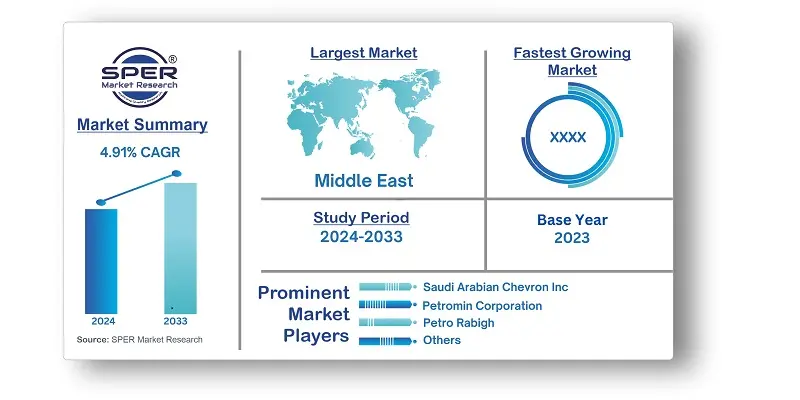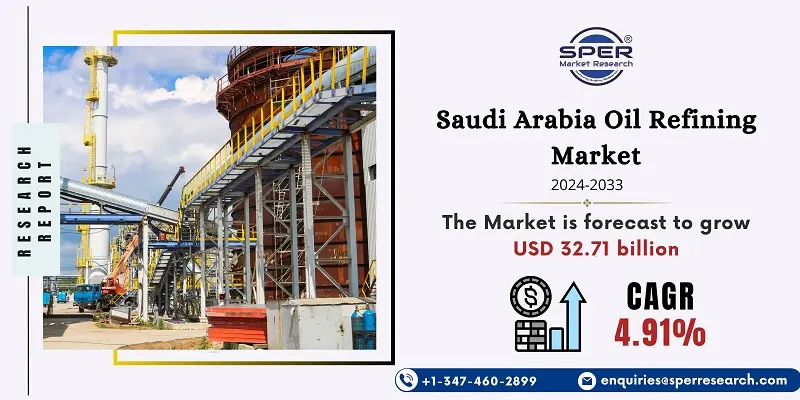
Saudi Arabia Oil Refining Market Growth, Size, Trends, Share, Revenue, Demand and Future Outlook
Saudi Arabia Oil Refining Market Size- By Complexity Type, By Product Type, By Fuel Type, By Application- Regional Outlook, Competitive Strategies and Segment Forecast to 2033
| Published: Jun-2024 | Report ID: POAE2450 | Pages: 1 - 115 | Formats*: |
| Category : Power & Energy | |||
- June 2023; A major participant in Saudi Arabia’s Oil refining industry, PetroTech Innovations, showcased its innovative technology designed to improve sustainability and efficiency in refining. The creative approach reduces environmental impact and streamlines refinery operation by integrating IoT based monitoring systems with AI-driven optimization. PetroTech’s emphasis on technological innovation fits nicely with the Kingdom’s dedication to sustainable energy practices and excellence in refining, meeting the changing needs of the oil refining sector.
- August 2023; RefineSecure, a prominent refinery operator in Saudi Arabia, has demonstrated its commitment to operational safety and environmental responsibility by introducing a comprehensive safety and stewardship program. The program ensures strict compliance with environmental requirements by introducing state of the art safety protocols and environmentally beneficial practices. The Kingdom’s oil refining industry is becoming more and more dependent on environmental sustainability and regulatory compliance, which is reflected in RefineSecure’s emphasis on responsible refining procedure.


| Report Metric | Details |
| Market size available for years | 2020-2033 |
| Base year considered | 2023 |
| Forecast period | 2024-2033 |
| Segments covered | By Complexity Type, By Product Type, By Fuel Type, By Application |
| Regions covered | Central Region, Western Region, Eastern Region, Northern Region, Southern Region. |
| Companies Covered | Petro Rabigh, Petromin Corporation, SAMREF, SASREF, Saudi Aramco, Saudi Aramco Lubricating Oil Refining Company, Saudi Arabian Chevron Inc, SATORP, and Yasref, Others. |
- Oil and Gas Companies
- Industrial Consumers
- Technology Providers
- Investors and Financial Institutions
- International Trade Partners
- Logistics and Transportation Companies
| By Complexity Type: |
|
| By Product Type: |
|
| By Fuel Type: |
|
| By Application: |
|
- Saudi Arabia Oil Refining Market Size (FY’2024-FY’2033)
- Overview of Saudi Arabia Oil Refining Market
- Segmentation of Saudi Arabia Oil Refining Market by Complexity Type (Topping, Hydro Skimming, Conversion, Deep Conversion)
- Segmentation of Saudi Arabia Oil Refining Market by Product Type (Light Distillates, Middle Distillates, Fuel Oil , Other)
- Segmentation of Saudi Arabia Oil Refining Market by Fuel Type (Gasoline, Gasoil, Kerosene, LPG, Others)
- Segmentation of Saudi Arabia Oil Refining Market by Application (Transportation, Aviation, Marine Bunker, Petrochemical, Residential and Commercial, Agriculture, Others)
- Statistical Snap of Saudi Arabia Oil Refining Market
- Expansion Analysis of Saudi Arabia Oil Refining Market
- Problems and Obstacles in Saudi Arabia Oil Refining Market
- Competitive Landscape in the Saudi Arabia Oil Refining Market
- Impact of COVID-19 and Demonetization on Saudi Arabia Oil Refining Market
- Details on Current Investment in Saudi Arabia Oil Refining Market
- Competitive Analysis of Saudi Arabia Oil Refining Market
- Prominent Players in the Saudi Arabia Oil Refining Market
- SWOT Analysis of Saudi Arabia Oil Refining Market
- Saudi Arabia Oil Refining Market Future Outlook and Projections (FY’2024-FY’2033)
- Recommendations from Analyst
1.1. Scope of the report1.2. Market segment analysis
2.1. Research data source
2.1.1. Secondary Data2.1.2. Primary Data2.1.3. SPER’s internal database2.1.4. Premium insight from KOL’s
2.2. Market size estimation
2.2.1. Top-down and Bottom-up approach
2.3. Data triangulation
4.1. Driver, Restraint, Opportunity and Challenges analysis
4.1.1. Drivers4.1.2. Restraints4.1.3. Opportunities4.1.4. Challenges
4.2. COVID-19 Impacts of the Saudi Arabia Oil Refining Market.
5.1. SWOT Analysis
5.1.1. Strengths5.1.2. Weaknesses5.1.3. Opportunities5.1.4. Threats
5.2. PESTEL Analysis
5.2.1. Political Landscape5.2.2. Economic Landscape5.2.3. Social Landscape5.2.4. Technological Landscape5.2.5. Environmental Landscape5.2.6. Legal Landscape
5.3. PORTER’s Five Forces
5.3.1. Bargaining power of suppliers5.3.2. Bargaining power of buyers5.3.3. Threat of Substitute5.3.4. Threat of new entrant5.3.5. Competitive rivalry
5.4. Heat Map Analysis
6.1. Saudi Arabia Oil Refining Market Manufacturing Base Distribution, Sales Area, Product Type6.2. Mergers & Acquisitions, Partnerships, Product Launch, and Collaboration in Saudi Arabia Oil Refining Market
7.1. Saudi Arabia Oil Refining Market Size, Share and Forecast, By Complexity Type, 2020-20267.2. Saudi Arabia Oil Refining Market Size, Share and Forecast, By Complexity Type, 2027-20337.3. Topping7.4. Hydro Skimming7.5. Conversion7.6. Deep Conversion
8.1. Saudi Arabia Oil Refining Market Size, Share and Forecast, By Product Type, 2020-20268.2. Saudi Arabia Oil Refining Market Size, Share and Forecast, By Product Type, 2027-20338.3. Light Distillates8.4. Middle Distillates8.5. Fuel Oil8.6. Others
9.1. Saudi Arabia Oil Refining Market Size, Share and Forecast, By Fuel Type, 2020-20269.2. Saudi Arabia Oil Refining Market Size, Share and Forecast, By Fuel Type, 2027-20339.3. Gasoline9.4. Gasoil9.5. Kerosene9.6. LPG9.7. Others
10.1. Saudi Arabia Oil Refining Market Size, Share and Forecast, By Application, 2020-202610.2. Saudi Arabia Oil Refining Market Size, Share and Forecast, By Application, 2027-203310.3. Transportation10.4. Aviation10.5. Marine Bunker10.6. Petrochemical10.7. Residential and Commercial10.8. Agriculture10.9. Others
11.1. Saudi Arabia Oil Refining Market Size and Market Share
12.1. Saudi Arabia Oil Refining Market Size and Market Share By Region (2020-2026)12.2. Saudi Arabia Oil Refining Market Size and Market Share By Region (2027-2033)12.3. Central Region12.4. Western Region12.5. Eastern Region12.6. Northern Region12.7. Southern Region
13.1. PETRO RABIGH
13.1.1. Company details13.1.2. Financial outlook13.1.3. Product summary13.1.4. Recent developments
13.2. PETROMIN CORPORATION
13.2.1. Company details13.2.2. Financial outlook13.2.3. Product summary13.2.4. Recent developments
13.3. SAMREF
13.3.1. Company details13.3.2. Financial outlook13.3.3. Product summary13.3.4. Recent developments
13.4. SASREF
13.4.1. Company details13.4.2. Financial outlook13.4.3. Product summary13.4.4. Recent developments
13.5. SATORP
13.5.1. Company details13.5.2. Financial outlook13.5.3. Product summary13.5.4. Recent developments
13.6. SAUDI ARABIA CHEVRON INC.
13.6.1. Company details13.6.2. Financial outlook13.6.3. Product summary13.6.4. Recent developments
13.7. SAUDI ARAMCO
13.7.1. Company details13.7.2. Financial outlook13.7.3. Product summary13.7.4. Recent developments
13.8. SAUDI ARAMCO LUBRICATING OIL REFINING COMPANY
13.8.1. Company details13.8.2. Financial outlook13.8.3. Product summary13.8.4. Recent developments
13.9. YASREF
13.9.1. Company details13.9.2. Financial outlook13.9.3. Product summary13.9.4. Recent developments
13.10. Others
SPER Market Research’s methodology uses great emphasis on primary research to ensure that the market intelligence insights are up to date, reliable and accurate. Primary interviews are done with players involved in each phase of a supply chain to analyze the market forecasting. The secondary research method is used to help you fully understand how the future markets and the spending patterns look likes.
The report is based on in-depth qualitative and quantitative analysis of the Product Market. The quantitative analysis involves the application of various projection and sampling techniques. The qualitative analysis involves primary interviews, surveys, and vendor briefings. The data gathered as a result of these processes are validated through experts opinion. Our research methodology entails an ideal mixture of primary and secondary initiatives.



Frequently Asked Questions About This Report
PLACE AN ORDER
Year End Discount
Sample Report
Pre-Purchase Inquiry
NEED CUSTOMIZATION?
Request CustomizationCALL OR EMAIL US
100% Secure Payment






Related Reports
Our Global Clients
Our data-driven insights have influenced the strategy of 200+ reputed companies across the globe.






















